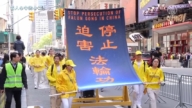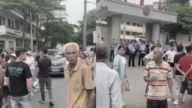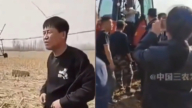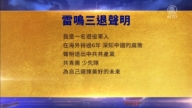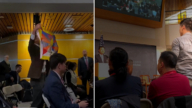【新唐人2011年8月20日讯】大陆铁道部发言人王勇平,因为在“7.23”动车追尾事故处理中发言不当,最近被当局免职。这一事件引来各界热烈的议论,也使媒体再度聚焦中共新闻发言人这一职业,并提出质疑说:这些政府发言人到底怎么了?中共到底需要什么样的发言人?
根据大陆官方消息,铁道部新闻发言人、政治部宣传部长王勇平被停职,将远赴波兰华沙,担任铁路合作组织的中方委员。在此之前,“7.23”动车追尾事故的新闻发布会上,王勇平回答记者有关当局的处理结果时,官味十足的说:“至于你信不信,我反正信了。”由此引发众怒。
《美国之音》报导指出,像王勇平这样的不当言论,在中共官员中是普遍现象,文章质疑:这些发言人到底怎么了?
中共党史学者林保华对《新唐人》表示,发言人实际上是中共的代言人,不能有自己独立的思想,都是按照政府和上级的指示说话。
林保华:“他也是为了铁道部的利益,来讲这些话,只是说,现在的民众不像以前那个样子,随便给你骗了。所以呢,他按照老一套来这样发言的话呢,结果就等于撞板了,就等于碰了钉子了。”
面对批评,王勇平曾经为自己辩解说:他做了政府需要他做的,他“问心无愧”。
郝晓明教授:“你作为一个发言人的话,你应该是站在一个公众的角度来看这个问题,站在一个媒体的角度来看这个问题。然后这样,你所回答的问题,你会想一个比较全面的范围来去考虑这个问题。不是简单的说,我代表政府,向你们怎么说,向你们怎么解释。”
2003年,大陆当局隐瞒非典疫情,让全世界哗然。为了减轻压力,当局开始大规模设立新闻发言人,并在2003年举办了首期新闻发言人培训班,王勇平就是其中的一位。
但是,随着中共政府公信力的日益丧失、民众维权意识的逐渐加强,这些在夹缝中生存的发言人面临着越来越尴尬的局面。
高瑜:“发言人制度呢,原来是一种,打算做出一种开放的姿态,过去很少有发言人,除了对外国记者,外交部,现在各个政府部门,好像是要对人们和媒体沟通,对舆论开放,实际上,这个事件呢说明,(中共)在宣传上也是非常失败的。”
不单是王勇平,在近期广受关注的“故宫哥窑事件”、“郭美美事件”中,新闻发言人的表现也无法让公众满意。不久前,中央党史研究室副主任李忠杰在新闻发布会上大打太极,搞得记者不知所云,也受到媒体的批评。
对于新闻发言人的极度“样板化”,有人形象的把他们概括为:“无可奉告型”、“照本宣科型”、“自我辩护型”、“恼羞成怒型”、“感情错位型”、“报喜不报忧型”。中共前外交部长李肇星也曾经坦承:新闻发言人不是“人”。
今年(2011年)5月份,河南大学宣布设立全国第一个“新闻发言人”专业,这一举措招来很大争议。有知名媒体人指出,这是“误人子弟”;网民则大胆直言:“说简单一点,(大陆)新闻发言人专业就是骗子专业,教你怎么说假话,怎么骗人。”
新唐人记者常春、李谦、李若琳采访报导。
What Should China’s Spokesman Do?
Ministry of Railways spokesman Wang Yongping,
was dismissed recently by the Chinese authorities,
for his inappropriate comments regarding the recent
7.23 rear-end high-speed train crash.
This led to hot debates in all walks of life.
Media also focus on the occupation of spokesmen in China.
They questioned what was wrong with these spokesmen,
and what kind of spokesmen is needed by the authorities.
According to official news in mainland China, Wang Yongping,
Ministry of Railways spokesman and director of political
propaganda department was suspended, and will go to
Poland, as a representative of a Chinese railway company.
Previously, on a press release about the recent high-speed
train accident, in response to a reporter’s question
about how the Chinese authorities handled the accident,
Wang said arrogantly, “No matter you believe it or not,
I believed it, anyway." This has infuriated the people.
Voice of America’s report pointed out that
such inappropriate remarks are very common in China.
The article questions: what’s wrong with these spokesmen?
Lin Baohua, scholar of the Chinese Communist Party’s (CCP)
history told NTD the spokesmen actually speak for the CCP;
they cannot have their own independent thoughts.
They just speak on orders of the officials and government.
Lin Baohua: “He spoke for the interests of the Ministry of
Railways. But now people cannot be deceived as before.
So if the spokesman spoke in the same old manner,
then he would end up in trouble."
Facing criticism, Wang defended himself that he did what the
government needed him to do, and he “didn’t feel guilty."
Professor Hao Xiaoming: “As a spokesperson, you should
speak from a public point of view, the media’s point of view.
Then you will consider this issue more comprehensively.
It is not simply to say, I represent the government,
and speak to you, and explain it to you."
In 2003, the Chinese authorities concealed SARS epidemic,
which shocked the whole world.
In order to relieve the pressure, the authorities began to
hire spokesmen in large quantity.
They held the first training session for spokesmen in 2003.
Wang Yongping was one of them.
However, with the diminishing credibility of the government,
the people gradually become aware of their rights.
Spokesmen who survive in the gap between the government
and the people face an increasingly embarrassing situation.
Media professional Gao Yu: “The spokesman system was
set up to show an open attitude.
In the past, there were very few spokesmen,
who were only in the Foreign Affairs department.
Now various government departments seem to communicate
with people and the media, and be open to the public.
This event shows that (the CCP’s) propaganda is a failure."
Besides Wang, other the spokesmen performed
unsatisfactorily in the recent cases, such as
the ‘Forbidden City Geyao Case’ and ‘Guo Meimei scandal’.
Not long ago, Li Zhongjie, deputy director of the Central Party
History Research Center made rounds at a press conference,
reporters did not understand what he was talking about,
which also drew media criticism.
Some classified the spokesmen into different types: such as
‘no comment type’, ‘scripted type’, ‘self-defense-type’,
‘angry-type’, ‘feelings dislocation type’,
and ‘reporting only good news type’.
Li Zhaoxing, former spokesman of Ministry of Foreign Affairs
admitted that spokesmen are not ‘human beings’.
In May 2011, Henan University announced to establish a
program to train spokesmen, which will be the first in China.
The move attracted much controversy.
Some well-known media professionals said it would be
a harmful education to the students.
Some netizens said, “The spokesman program is for liars.
It teaches you how to lie and to deceive others."
NTD reporters Chang Chun, Li Qian and Li Ruolin



